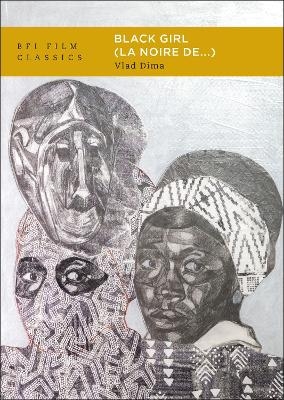
Black Girl (La Noire de...)
Seiten
2025
BFI Publishing (Verlag)
978-1-83902-735-2 (ISBN)
BFI Publishing (Verlag)
978-1-83902-735-2 (ISBN)
- Noch nicht erschienen (ca. Juni 2025)
- Versandkostenfrei innerhalb Deutschlands
- Auch auf Rechnung
- Verfügbarkeit in der Filiale vor Ort prüfen
- Artikel merken
Ousmane Sembène was one of the greatest, most groundbreaking filmmakers in the history of cinema, an acclaimed novelist, and the most renowned African director of the twentieth century. Black Girl was his brilliant, blistering debut. Released in 1966, it won the Prix Jean Vigo at the Cannes Film Festival that year. The film is about a young Senegalese woman, played powerfully by M’Bissine Thérèse Diop, who moves to France to work for a wealthy white family as a nanny, but quickly discovers that life in their apartment is a prison, both figuratively and literally; but it is also a searing, nuanced critique of the lingering colonialism in the supposedly postcolonial world.
Vlad Dima's study of Black Girl argues that the film helped to map the future of African cinema. He situates it within its postcolonial context, considering its adaptation from the eponymous short story first published in 1962. He examines the performances of Mbissine Thérèse Diop (Diouana), Anne-Marie Jelinek (Madame) and Robert Fontaine (Monsieur), considering the ways in which they embody or subvert postcolonial, French archetypes, and then goes on to examine the technical aspects of Sembene's filmmaking, such as his innovative use of framing and aural composition. Finally, he traces the film's lasting influence on African cinema, from Sembène’s own Xala (1975), to Safi Faye’s Mossane (1996), Joseph Gaï Ramaka’s Karmen Geï (2001), Jean-Pierre Bekolo’s Saignantes (2005), and Mati Diop's Atlantics (2019).
Vlad Dima's study of Black Girl argues that the film helped to map the future of African cinema. He situates it within its postcolonial context, considering its adaptation from the eponymous short story first published in 1962. He examines the performances of Mbissine Thérèse Diop (Diouana), Anne-Marie Jelinek (Madame) and Robert Fontaine (Monsieur), considering the ways in which they embody or subvert postcolonial, French archetypes, and then goes on to examine the technical aspects of Sembene's filmmaking, such as his innovative use of framing and aural composition. Finally, he traces the film's lasting influence on African cinema, from Sembène’s own Xala (1975), to Safi Faye’s Mossane (1996), Joseph Gaï Ramaka’s Karmen Geï (2001), Jean-Pierre Bekolo’s Saignantes (2005), and Mati Diop's Atlantics (2019).
Vlad Dima is Professor and Chair of the Department of African American Studies at Syracuse University, USA. His books include Sonic Space in Djibril Diop Mambety's Films (2017), The Beautiful Skin: Football, Fantasy, and Cinematic Bodies in Africa (2020), and Meaninglessness: Time, Rhythm, and the Undead in in Postcolonial Cinema (2022). He has published numerous articles, mainly on French and francophone cinemas, but also on Francophone literature, comics, American cinema, and television.
1. Sonic Frames: Where it Begins
2. Characters
3. Objects
4. Visual Frames: Where it Ends
Credits
Endnotes
| Erscheint lt. Verlag | 12.6.2025 |
|---|---|
| Reihe/Serie | BFI Film Classics |
| Zusatzinfo | 60 bw illus |
| Sprache | englisch |
| Themenwelt | Kunst / Musik / Theater ► Film / TV |
| Sozialwissenschaften ► Kommunikation / Medien ► Medienwissenschaft | |
| ISBN-10 | 1-83902-735-5 / 1839027355 |
| ISBN-13 | 978-1-83902-735-2 / 9781839027352 |
| Zustand | Neuware |
| Informationen gemäß Produktsicherheitsverordnung (GPSR) | |
| Haben Sie eine Frage zum Produkt? |
Mehr entdecken
aus dem Bereich
aus dem Bereich
Eine Einführung
Buch | Softcover (2022)
Springer VS (Verlag)
32,99 €
wie KI und virtuelle Welten von uns Besitz ergreifen – und die …
Buch | Hardcover (2023)
Heyne (Verlag)
22,00 €


